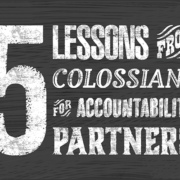What does the voice in your head sound like?
C’mon . . . I know you have one. It’s not about talking to yourself or about admitting to the “voices in your head,” but about the one inner voice you’ve had for as long as you can remember. It’s probably the voice you hear up there as you’re reading this. Or, maybe it’s the voice that’s about to say, “what is this guy even talking about?”
Yeah, that one.
We all have an inner voice, but you know who doesn’t? The absolute rest of God’s creation. From everything scientists can tell, other animals don’t really think about what they’re doing before they do it – at least, not like humans do. Dog sees a treat. Dog eats the treat. The dog might hesitate if there’s danger in the way, but it’s not going to count the Weight Watcher points, think about beach season or wonder later if they really should’ve indulged.
In the same way, a tree doesn’t think about growing. A rock doesn’t think about . . . uh, rocking.
The Latin name for humans is actually related to this very point: Homo Sapiens Sapiens. Some simply translate that, “The very wise man,” but that’s not quite right. It literally means, “The man who knows that he knows.” Or, even clearer, it can mean, “the man who thinks about his thinking.”
When God breathed into Adam and gave him (and thus all of us) a rational soul, it sparked within mankind the ability not only to think about our actions, but also to examine our own thoughts. It is a tremendous gift, but . . . like everything sin touches, it can also be a tremendous burden.
I’ll ask again. What does the voice in your head sound like?
For many, the voice in their head sounds a lot like a narrator voiceover in a TV show about their life. Our inherent narcissism paints us as the lead character in our very own sitcom with everyone else either as a supporting role or as the villain.
At other times, our inner voice sounds like the scene in a court room drama. Satan whispers about our innumerable wrongs and we either tell ourselves stories to defend our actions (to an audience of one, no less) or we play prosecutor and wrack ourselves with guilt.
In either of those scenarios, it’s clear that we’ve taken a tremendous gift of God and done what mankind always does with God’s good and gracious gifts – we’ve ruined them by making it all about us.
There’s actually a fancy Latin term for that as well, incurvates in se. Literally, “curved inward on oneself.” Saint Augustine was likely the first to use the term, but it later gained quite a bit of traction in the works of Martin Luther who was both a fan of Augustine in general (being a member of the Augustibiab Order as a monk) but also the concept that so much of our problems in life have to do with being too preoccupied on ourselves.
In his “Lectures on Romans,” Luther wrote:
“Our nature, by the corruption of the first sin being so deeply curved ib on itself (incurvates in se) that it not only bends the best gifts of God towards itself and enjoys them, as is plain in the works-righteous and hypocrites, or rather even uses God himself in order to attain these gifts, but it also fails to realize that it so wickedly, curvedly, and viciously seeks all things, even God, for its own sake.”
This is our human condition in a nutshell. What does the voice in our head sound like? It sounds self-obsessed, self-absorbed and unable to really diagnose the condition of anything outside of our immediate wants and needs.
The English idiom, “navel-gaze” is related to this concept as well, and that’s a pretty solid picture for the life of a human—so curved in on oneself that we not only can’t see the forest for the trees, we can’t even see the trees past our own belly buttons.
This presents a huge problem in how we deal with the sin in our life.
One of Satan’s greatest weapons is isolating a sinner within his sin. Our natural inclination to think only of ourselves makes his assaults so much easier. And so, what starts as a seemingly harmless impulse or as toeing the line between right and wrong leaves us alone, broken and in a metaphorical (or perhaps literal) fetal position too curved in on ourselves to be of any use to anyone, let alone ourselves.
It plays out in the moment. “This sin can’t hurt anyone,” we tell ourselves. Of course, miles down life’s road, that same sin can be remembered as the start of a painful, destructive process. A little foresight would be nice, but we were too busy being curved in on ourselves and thinking only of what we wanted.
Even more dangerously, this plays out in how we deal with guilt and shame . . . internalizing over and over and over again. Making not only the sin about us, but also the punishment and forgiveness all about how we feel in any given moment.
God, save us from this!
He has.
“I lift up my eyes to the mountains,” Psalm 121 says. “Where does my help come from? My help comes from the Lord, the Maker of heaven and earth.”
This Psalm of Ascents was written to be sung as worshippers were on their way up to the Temple, built on a literal mountain (Mount Zion). It’s also, traditionally, a Psalm used by the Christian Church in Lent—a time where we are encouraged to think soberly about our heart’s condition and where we have more muted praise as we ponder our Lord’s passion.
“I lift up my eyes to the mountains . . .” Is there anything more powerful than the picture of a sinner finally straightening up to focus on something other than themselves? This, of course, is not done by our own power, but only through Jesus’ sacrifice and by the work of the Holy Spirit.
As we fit our eyes to the mountains, we focus on Mount Calvary where Jesus paid the full atonement for all sin—large, small, habitual, life-damaging, relationship-ruining and the like. As we look for the solution in ourselves, God straightens us up and our weary eyes learn to focus on his son, a solution that was there all along.
And, so, we fix our eyes on yet another mountain, Mount Zion once again. This time, as a picture of Heaven used over and over throughout scripture, a Heaven that is yours, a Heaven that is already won for you, a Heaven that is full of the richest pleasures we could never find within ourselves.
Author: Michael Schottey, Palm Coast, Florida


















